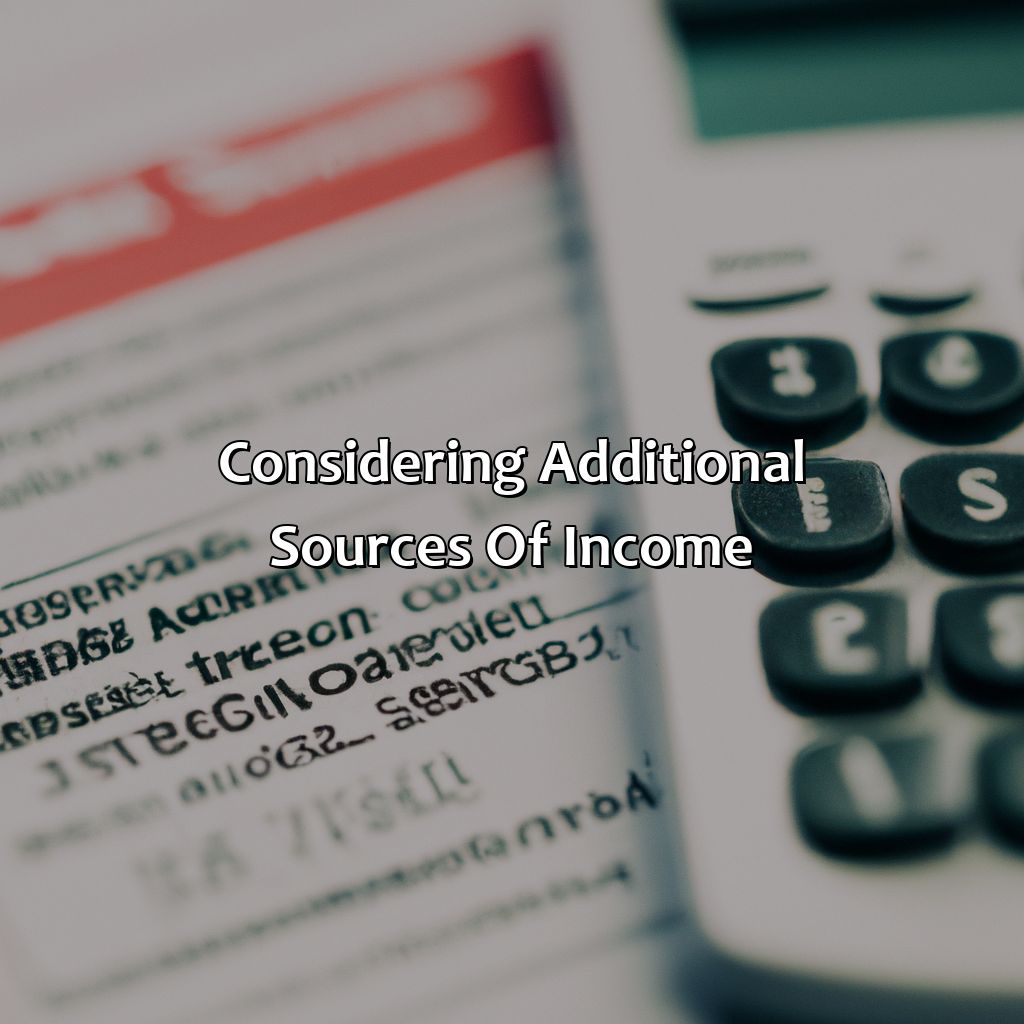How Much House Can I Afford On Social Security?
Key Takeaway:
- Understanding Social Security Benefits: Social Security benefits are a form of retirement income that can help you determine how much house you can afford. It is important to understand the different types of benefits and how they are calculated to accurately determine your monthly income.
- Calculating Monthly Income From Social Security: To determine how much house you can afford on Social Security, you need to calculate your monthly income from Social Security. This can be done by reviewing your benefit statements or using the Social Security Administration’s online calculator.
- Determining How Much of Your Income Can be Used for a Mortgage Payment: To determine how much house you can afford, you need to estimate your monthly expenses and calculate your debt-to-income ratio. This will help you determine how much of your income can be allocated towards a mortgage payment. It is also important to consider additional sources of income to supplement your Social Security benefits.
Are you relying on Social Security to help fund your retirement? You may be wondering how much house you can afford on your Social Security income. In this article, we’ll provide you with the information you need to make an informed decision.
Understanding Social Security Benefits
Understanding Social Security Benefits
Social Security Benefits are government-provided financial support for elderly citizens or those with disabilities. As the primary source of income for retired Americans, Social Security benefits can be crucial to maintain a decent standard of living. These benefits are determined based on a formula that considers work history and age of retirement.
To get the most out of Social Security benefits, it is important to understand how they work. The benefits vary depending on retirement age, income, and past work history. Furthermore, benefits can be affected by factors such as marriage, divorce, and survivorship. It is essential to seek assistance from expert financial advisors to maximize the benefits.
In addition, Social Security Benefits have a comprehensive history. The program began in 1935 as a part of the New Deal. It was aimed at providing financial assistance to the elderly and has since expanded to include benefits for retirees, disabled workers, and surviving family members. Overall the program has helped millions of Americans to maintain financial stability in retirement.
Understanding Social Security benefits is crucial to secure a comfortable retirement and to avoid being financially vulnerable. It is essential to explore all options and seek professional advice to get the most out of the program’s benefits.

Image credits: retiregenz.com by David Duncun
Calculating Monthly Income From Social Security
Calculating Monthly Income From Social Security can be crucial for those planning their budget. It involves various factors such as age, retirement age, income history, and family status. To make the process easier, here are six simple steps to calculate monthly income from social security:
- Collect Income History: Gather all necessary documents and records that show your lifetime earnings and calculate your average indexed monthly earnings (AIME).
- Determine Full Retirement Age: Your full retirement age depends on the year you were born. It ranges from 66 to 67 years old.
- Calculate Primary Insurance Amount: Using a formula provided by Social Security Administration (SSA), calculate your Primary Insurance Amount (PIA).
- Include Cost-of-Living Adjustments: Social Security benefits may increase each year to reflect inflation. If so, include the cost-of-living adjustment (COLA) in your calculation.
- Add Spousal Benefits: If you are married, consider the spousal benefits you may be entitled to. It can increase your monthly income from Social Security.
- Consider Working: If you plan on working while receiving Social Security benefits, know that it may affect your benefits. Consult with SSA for details and adjustments.
It is important to note that the monthly income from Social Security may vary depending on individual circumstances. Consult with SSA for detailed and accurate information.
Pro Tip: If you delay your retirement age, your monthly income from Social Security may increase. Consider your options and choose the path that best suits your financial needs.

Image credits: retiregenz.com by Joel Arnold
Determining How Much of Your Income Can be Used for a Mortgage Payment
Determining Your Mortgage Payment Capacity
Calculating how much of your available income can be allocated to paying off a mortgage is crucial in deciding how much house you can afford. The determination of your mortgage payment capacity must be done prior to initiating the home buying process.
Knowing your mortgage payment capacity allows you to avoid taking on more debt than you can handle, thus protecting you from significant financial stress. To determine your mortgage payment capacity, you need to assess your existing monthly income against your other financial obligations such as bills, loans, and expenses.
It is important to note that every individual’s financial status and needs vary, so do their mortgage capacity requirements. Hence, it is advisable to seek professional help to determine your unique mortgage payment capacity.
To explore the concept further, it is evident that assessing mortgage payment capacity is not a new financial concept. It originated in the mid-1900s when government officials established financial regulations to protect consumers from predatory lending practices by lenders.
Overall, it is essential to determine your mortgage payment capacity before initiating the home buying process as it can position you to make a confident and informed purchase.

Image credits: retiregenz.com by David Woodhock
Considering Additional Sources of Income
Considering Other Streams of Income:
Individuals with social security benefits may need to consider other sources of income when looking to determine how much house they can afford. This can be in the form of retirement savings, pensions, or even rental income. These additional sources can provide a boost to one’s overall income and help to qualify for a higher loan amount.
Moreover, having a co-borrower could also increase the amount of mortgage one can afford. Lenders consider the income and assets of all borrowers when deciding on the loan amount. Additionally, utilizing assets for a down payment may also help in qualifying for a larger mortgage.
Furthermore, it is essential to remember that taking on a mortgage is a significant financial responsibility, and it is crucial to establish a monthly budget first. It can be helpful to work with a financial planner to determine which expenses could be reduced to accommodate the monthly mortgage payment.
Considering all these factors, it is imperative to make an informed decision regarding the mortgage amount being borrowed, as it can significantly affect one’s financial liabilities in the long run.

Image credits: retiregenz.com by Joel Washington
Five Facts About How Much House Can I Afford on Social Security:
- ✅ Social Security benefits can be used to qualify for a mortgage loan, but the amount you receive may impact your eligibility and how much you can afford. (Source: The Balance)
- ✅ Lenders consider your debt-to-income ratio when determining how much house you can afford on Social Security. (Source: Investopedia)
- ✅ Down payment and credit score are also factors that impact how much house you can afford on Social Security. (Source: Bankrate)
- ✅ The maximum Social Security benefit for a retiring worker in 2021 is $3,895 per month. (Source: The Motley Fool)
- ✅ It’s recommended to aim for a mortgage payment that doesn’t exceed 28% of your monthly income including Social Security benefits. (Source: U.S. News & World Report)
FAQs about How Much House Can I Afford On Social Security?
How much house can I afford on Social Security?
Retirees living on fixed income, including Social Security, may wonder how much house they can afford and whether they can obtain a mortgage. The answer to this question relies on a few factors, including your monthly income, expenses, credit score, and financial goals.
What are the key factors that determine how much house I can afford on Social Security?
Your monthly income, expenses, credit score, and financial goals play important roles in determining how much house you can afford on Social Security. You may use an online mortgage calculator to determine the monthly mortgage payment and how much mortgage you can afford based on your income, expenses, and interest rates.
Is it possible to get a mortgage on Social Security?
Retirees on fixed incomes, including Social Security, may obtain a mortgage if they meet the lender’s requirements for income, credit score, and debt-to-income ratio. Some lenders have specialized programs for retirees, including those on Social Security, which may collect additional income, such as pensions or retirement savings.
How can I improve my chances of getting a mortgage on Social Security?
If you are on Social Security, there are steps you may take to improve your chances of getting a mortgage, such as improving your credit score, reducing your debt-to-income ratio, having savings as a down payment, and working with a lender that specializes in retirement income mortgages.
Does my credit score matter when obtaining a mortgage on Social Security?
Your credit score may matter when obtaining a mortgage on Social Security, as it affects your ability to qualify for the loan and your interest rates. You may check your credit report and score before applying for a mortgage, and take steps to improve your score by paying bills on time, reducing debt, and disputing errors on the report.
Can I use a reverse mortgage to purchase a house on Social Security?
Reverse mortgages may provide an option for retirees on fixed income, including Social Security, to purchase a house without a monthly mortgage payment. However, reverse mortgages have restrictions and costs, and may not be the best option for everyone. You may need to compare the costs and benefits of a reverse mortgage against other types of mortgages and financial plans.


